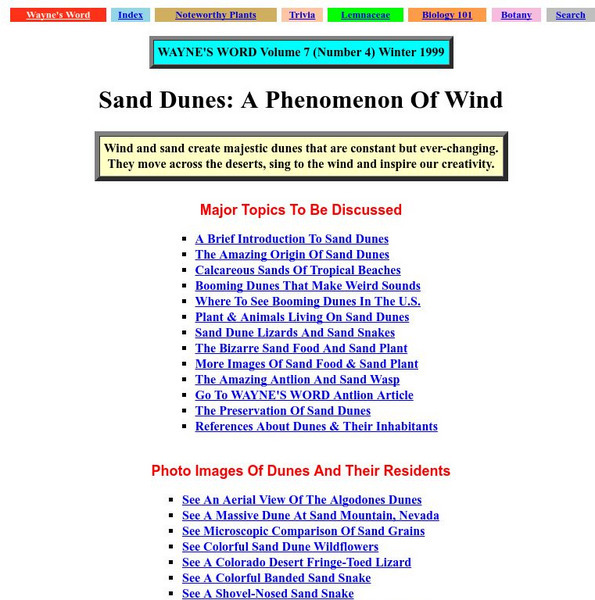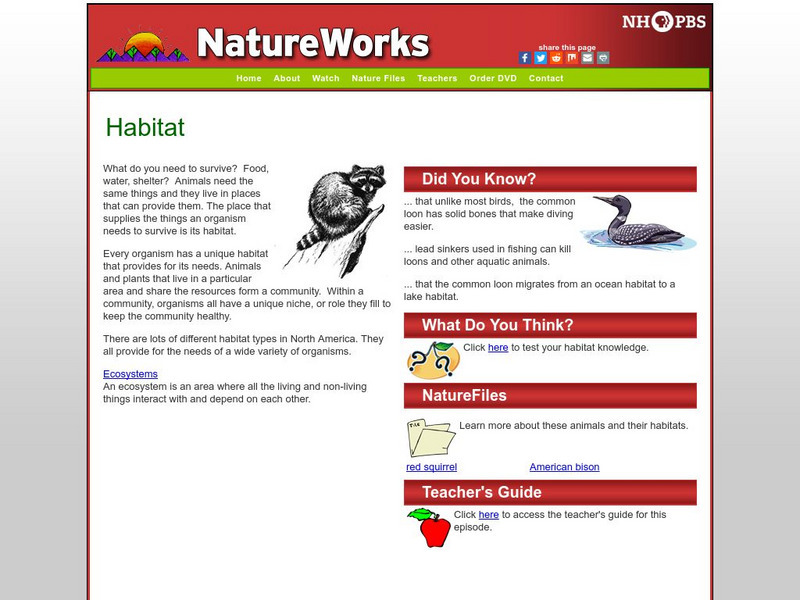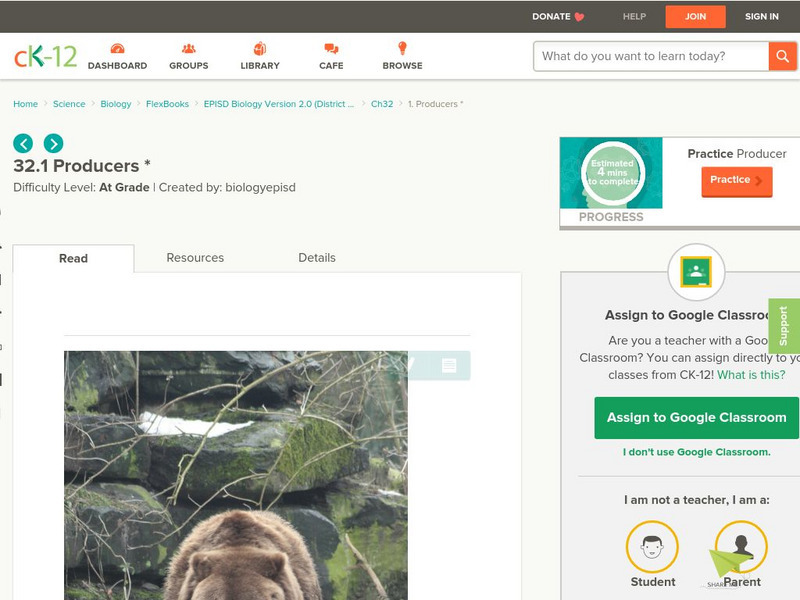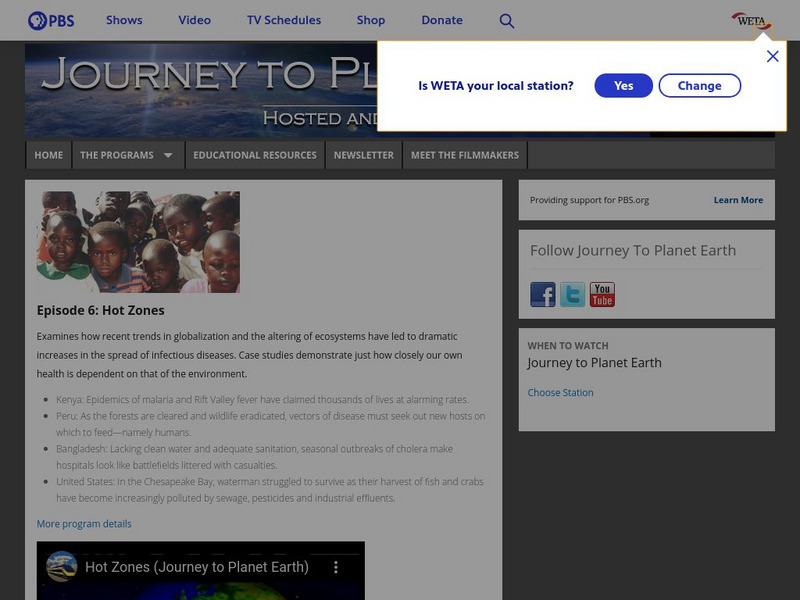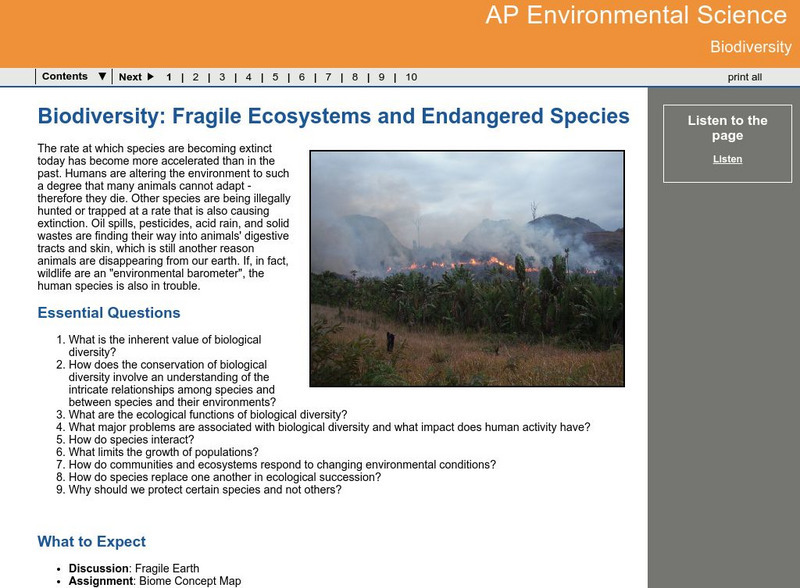American Institute of Biological Sciences
Action Bioscience: The Value of Healthy Estuaries
An article featuring the complexity of estuaries which highlight the value these systems have to human and wild life.
The Association of the British Pharmaceutical Industry
Abpi: Human and Animal Habitats
An interactive learning game where students answer whether or not certain environments would be suitable for different animals. Printable worksheets are available for review at the end of the activity.
University of California
Ucmp: The World's Biomes
The University of California Museum of Paleontology hosts this site devoted to the study of the earth's biomes, which are the world's major communities, classified according to the predominant vegetation and adaptations of organisms to...
University of Michigan
University of Michigan: Global Change: The Flow of Energy: Higher Trophic Levels
This lesson addresses the following questions: What is the efficiency with which energy is converted from trophic level to trophic level? What are the differences between assimilation efficiency, net production efficiency, and ecological...
Palomar Community College District
Wayne's Word: Sand Dunes: A Phenomenon of Wind
An engaging natural history of sand dunes. From beaches to deserts you will learn about the formation and ecology of these ecosystems.
Other
Alberta Environment: Alberta Grasslands: A World at Your Feet [Pdf]
This excellent 64-page teaching resource looks at the historical and geological past of the Alberta grasslands, their biodiversity, threats they face from human activities, and steps being taken to conserve them. The unit is designed for...
PBS
Pbs Learning Media: Earth a New Wild: Ecosystem Explorer
Three choices of virtual worlds to enter: a vulture, a wolf or a shark world. Once inside these worlds view videos, play games, and discover the ecosystems of these wild animals.
PBS
Nh Pbs: Nature Works: Habitat
What do you need to survive? Food, water, shelter? Animals need the same things and they live in places that can provide them. This informative site looks at the characteristics, range, habitat, food, reproduction and behavior of the red...
National Geographic
National Geographic: Coral Reef Food Web
Explore the food web in a coral reef with these illustration. Identify the consumers, producers, and decomposers that are located within this ecosystem. Site includes illustration exploring the different food chains as well as questions...
National Geographic
National Geographic: Coral Reef Fish Survey Simulation
Students will learn surveying methods for an ecosystem through a short video. The video focuses on exploring the number and types of fish and the health of the coral reef ecosystem. Site includes a lesson plan and activity worksheet.
Annenberg Foundation
Annenberg Learner: The Habitable Planet: Ecosystems: Energy Flow Through
Detailed explanation of the processes by which energy flows through an ecosystem. Scroll down and open Section 3.
Other
Pde Sas: Relationships Among Organisms
In this lesson, students compare various types of relationships among organisms (i.e., biotic interactions). Students will: explain the roles of producers and consumers, and predators and prey in an ecosystem. Explain the levels of order...
University of Illinois
University of Illinois Extension: Natural Resources, Environment, and Ecosystems
A collection of lesson plans for specific age levels to help students gain a better understanding of animals, plants, and people, and how they affect each other in ecosystems. Many of the activities provide discussion questions and...
CK-12 Foundation
Ck 12: Episd: Ecosystems
[Free Registration/Login may be required to access all resource tools.] Explore ecosystems and ecology on an introductory level uncovering fact about types of ecosystems and the competitive exclusion principle.
CK-12 Foundation
Ck 12: Episd: Energy Pyramids
[Free Registration/Login may be required to access all resource tools.] Understand how energy flows within ecosystems through the use of energy pyramids.
CK-12 Foundation
Ck 12: Episd: Producers
[Free Registration/Login may be required to access all resource tools.] Students will recognize and understand the role of producers in the food chain within different ecosystems.
CK-12 Foundation
Ck 12: Episd: Consumers and Decomposers
[Free Registration/Login may be required to access all resource tools.] Based upon the way organisms acquire their energy students will understand how to group them as consumers, decomposers or producers.
PBS
Pbs: Journey to Planet Earth: Hot Zones
This online companion to the PBS series "Journey to Planet Earth: Hot Zones" explores how changes in ecosystems can lead to increased risk and transmission of infectious diseases. Highlights include video clips and educational resources.
PBS
Pbs: Journey to Planet Earth: Rivers of Destiny
Journey to four major river systems - the Mississippi, Amazon, Jordan and Mekong rivers - and take a look at the challenges happening to the people whose livelihood hinges around them.
Georgia Department of Education
Ga Virtual Learning: Ap Environmental Science: Biodiversity
Through an interactive learning module, students investigate the importance of species richness and biological diversity.
Georgia Department of Education
Ga Virtual Learning: Life and Environment Relationships
In this amazingly comprehensive interactive tutorial you will learn about the characteristics and features of the different biomes on our planet.
TeachEngineering
Teach Engineering: Biodomes Engineering Design Project: Lessons 2 6
In this lesson students learn about biodomesand how engineers use them. Students then create their own biodomes.
TeachEngineering
Teach Engineering: Working Together to Live Together
Students experience civil and environmental engineering by planning a housing development in an existing biome, while also protecting the native species that live there. They conduct research, draw plans, make brochures and give...
TeachEngineering
Teach Engineering: Biodomes
Students explore the biosphere's environments and ecosystems, learning along the way about the plants, animals, resources and natural cycles of our planet. Over the course of lessons 2-6, students use their growing understanding of...




